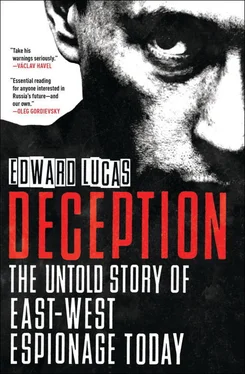The rules that hamper terrorists and money-launderers have also hit espionage. Opening an anonymous bank account in Vienna, accessed perhaps with a password, or by presenting half a torn postcard (the bank had the other half and would simply check that they fitted), was easy thirty years ago. Now banks are supposed to ‘know their customers’. In clandestine work, even a passport or home electricity bill requires forgery; creating a credit history that will stand up to checking is a serious nuisance. These hassles are potentially lethal. Imagine that you are a North Korean official in Vienna, who is considering selling some secrets. Your home is subject to regular searches by your fearsome State Security Department. If they get suspicious, you go home to eat grass in one labour camp while your wife gnaws tree bark in another. If you are paid in wads of €500 notes and keep them in a bank safety deposit box, you not only miss out on the interest: if you survive long enough to get the money out, you will find that large quantities of cash, gained from an undisclosable source, are more of a problem than a delight.
Some spy agencies therefore run a notional bank account for a source, letting interest build up on the ‘salary’. Assuming the agent reaches retirement, the money is a nest egg for his new life. This also avoids the danger of conspicuous consumption, which can easily attract unwelcome interest. Another trick is to pay agents in rare stamps. These are easily portable, highly concealable, readily exchanged into cash – and leave no trace. Other means include gambling chips from casinos, especially from chains that allow them to be exchanged for cash in any one of several countries. Keeping intelligence officers themselves supplied with money is tricky too. Those working under alias need credit cards that will withstand a credit check. But they may also need to make or receive payments that leave no electronic trace. Here the kind of dodgy money-transfer company that Ms Chapman seems to have been associated with during her time in London (which I describe in the next chapter) can come in useful. Also handy are prepaid debit cards that can be topped up with cash. These featured in the contents of the Boston home of two other spies, ‘Donald Heathfield’ and his wife, listed in the search warrant obtained by the FBI. 2
Good spies are not only manipulative and ingenious; they also need good memory skills: when writing things down is dangerous, the easy and accurate recall of number plates, phone numbers, map references and passwords is vital. Spies are naturally inquisitive, and pedantic when it comes to facts, figures, times and dates. They have good Thespian skills, being able to think themselves deeply and convincingly, like a Stanislavski-trained actor, into someone else’s character. All these qualities, however, do not eliminate the paradoxes of spying: first, that using secretly obtained information necessarily endangers its source; second, that systematic attempts to be inconspicuous risk being noticed; and third, that the sort of people who deal in broken promises are unlikely to be good at keeping them.
For those running spy agencies the last of these is the worst. The people most drawn to the shadows are often those people most unsuited to working there. Though some spy for noble or intellectual reasons, for others their motivation is part of the problem, not its solution. The lucrative opportunities that the private sector offers ex-spies can erode loyalties, especially in later years as the job market looms. Those with a philosophical or mystical bent sometimes feel themselves to be part of a lay priesthood, armed with the powers of the curse and the confessional. This can shade into weirdness. Espionage also attracts those obsessed by secrecy for its own sake, and, most lethally, those for whom betrayal is a tantalising extra thrill. Breaking the other side’s rules brings a buzz; sidestepping your own team’s a bigger one. The more adept you are in the dark arts, the more tempting it is to use them widely. At a harmless level, that can involve simply fiddling expense accounts, charging meals and taxis to operational funds. It can mean bending the rules to do a pal a favour. It also invites sexual shenanigans. Spies only rarely use bedroom arts in pursuit of official business: their bosses usually veto such plans, wisely fearing that emotions may impinge on the operation. Outside work, intelligence officers are often formidable adulterers and fornicators – they know all too well how to cover tracks and avoid suspicion. In a life constrained by rules and routines, the temptation to throw over the traces can be huge. Betraying spouses can be a step to betraying secrets.
Regular counter-intelligence screening can uncover suspicious patterns of behaviour, or anomalies in the subject’s private life. But the more senior and experienced the subject of scrutiny, the harder it is to trip him up – and the more damage he can do. Aleksandr Poteyev, the American agent at the heart of Russian intelligence who betrayed Ms Chapman and her colleagues, had apparently escaped routine lie-detector tests by virtue of seniority and good connections. Spies are necessarily practised and skilful in fending off unwelcome questions and concealing their real intentions and feelings. The endemic duplicity of the profession makes it hard to deliver sincere praise or to appreciate it.
The mutual dislike that often exists between spies and spy-catchers poses a further problem. Counter-intelligence officers tend to be suspicious, methodical types who like every fact to be nailed down and distrust flair, initiative or anything irregular. It would be only a slight exaggeration to say that they see their field-officer colleagues as a self-indulgent menace to security. For their part, the active spies are at heart intuitive rule-breakers with a strong sense of the rightness of their own judgement. They think the spycatchers’ silly rules hamper the chance of doing any real work. (This is one reason why his former colleagues from the elite foreign-espionage division of the KGB detest Mr Putin, who was a lowly counter-intelligence officer during his time in Germany.) The rivalry can be debilitating. When agencies such as the FBI or Britain’s Security Service scent a spy on their turf, their priority is to arrest him to protect the nation’s secrets. When the CIA or SIS (the official title of MI6) finds one, their instinct is to watch, not pounce. The longer the game, the more they learn about the other side’s methods and sources, and the greater the chance of a successful ruse – recruiting the traitor as a double agent, feeding disinformation to the other side, or trying to flush out his case officer or controller.
The constant aim of intelligence work is to provide otherwise unobtainable information to policymakers. But spy agencies vary in size, techniques, susceptibility to political interference and most of all effectiveness. A good index of excellence is discretion: crudely, the lower the profile, the greater the success. Sweden’s Kontoret för särskild inhämtning (Office of Special Collection) is a clear winner. It has no published street address, let alone a website. 3Another variable is necessity. Countries facing an existential threat tend to take their security seriously. Those that don’t (Belgium springs to mind) see it as a low priority. Poor countries find it hard to keep their spy services honest, as the rewards for misbehaviour are proportionately greater for those on low salaries. Spookish meddling in public life is a big problem in many ex-communist countries, where compromising information is political currency. An agency’s ability to bug politicians’ telephones can easily divert its attention from threats to the national interest.
The essential elements of espionage everywhere – boredom, deceit, secrecy and ambition – are an inherently toxic compound. The success or failure of a spy service depends on its ability to mitigate the negative effects of this compound, through selection, training, morale, discipline, scrutiny, and procedure. For all the high stakes and sharp wits, the biggest part of espionage is therefore meticulous, careful work; it can even be rather dull. The focus on routine also reflects the paradox that the most successful breaches of a rule are unmarked. A truly successful operation goes unnoticed by everyone but those who ran it. Every trace left restricts future options and increases the risk of the other side limiting the damage, taking countermeasures and tracking down sources. The hallmarks of successful spying are pedantic planning, plentiful patience, prudent precautions, and most of all invisibility.
Читать дальше












